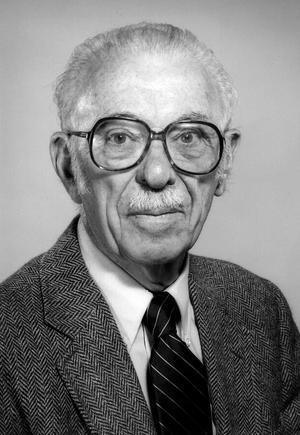The Man Who Turned Antibiotics Into Animal Feed–Part 2

Thomas H. Jukes (Photo: UC BERKELEY)
Thomas H. Jukes, the man who turned antibiotics into animal feed, was a remarkable biologist. Born in 1903, he was an old school environmentalist, a life member of the Sierra Club, an enthusiastic outdoorsman, and in later years when he was a professor at the University of California at Berkeley, a pioneer in the new science of molecular biology.
He was also an ardent defender of science, or at least his view of it. He wrote hundreds of opinion pieces, often polemical, on topics of the day, and, among other achievements, fought effectively to prevent the introduction of creationism into California schools. He also campaigned against quack cancer cures, and lambasted Nobel-winning chemist Linus Pauling for advocating massive vitamin doses as a panacea.
But Jukes formed his ideas in an age of medical miracles, and firmly believed in the power of science to conquer sickness and hunger. So he also defended the use of DDT against malaria, even calling attempts to ban the insecticide “unquestionably genocidal”. When the prescription drug DES, or diethylstilbestrol, became notorious in the 1970s for causing birth defects and cancers in young women, Jukes argued for its continued use as a growth promoter in cattle, saying the risk to consumers was minuscule. He took what he saw as a rigorous, evidence-based approach to such questions, in contrast to the supposedly “emotional” language of the emerging environmental movement. He often quoted Renaissance medical writer Paracelsus who believed that everything and nothing is poisonous, or as Jukes noted: “The dose alone makes the poison.”
His fierce opposition to environmental critics undoubtedly reflected his own career history. Before moving to Berkeley in 1963, Jukes had spent his most productive years, from his mid-30s to his late 50s, in the pharmaceutical industry. He worked for Lederle, a division of American Cyanamid, at a facility just outside New York City that now belongs, by a series of mergers, to pharmaceutical giant Pfizer. There, his own writing indicates, he was considerably less rigorous about insisting on detailed experimental evidence.
In particular, his 1985 memoir of how antibiotics first came to be used in livestock feed is often startling to a modern reader because of the casual and freewheeling nature of the pharmaceutical business in the era before the thalidomide birth defect headlines of the 1960s launched strict modern regulation of drug safety. Jukes’ article made it clear that he regarded the unfettered environment in the industry in the mid-20th century as a key to that era’s genius for invention. He and other pioneers “retain a warm spot for those early days”, he wrote.





